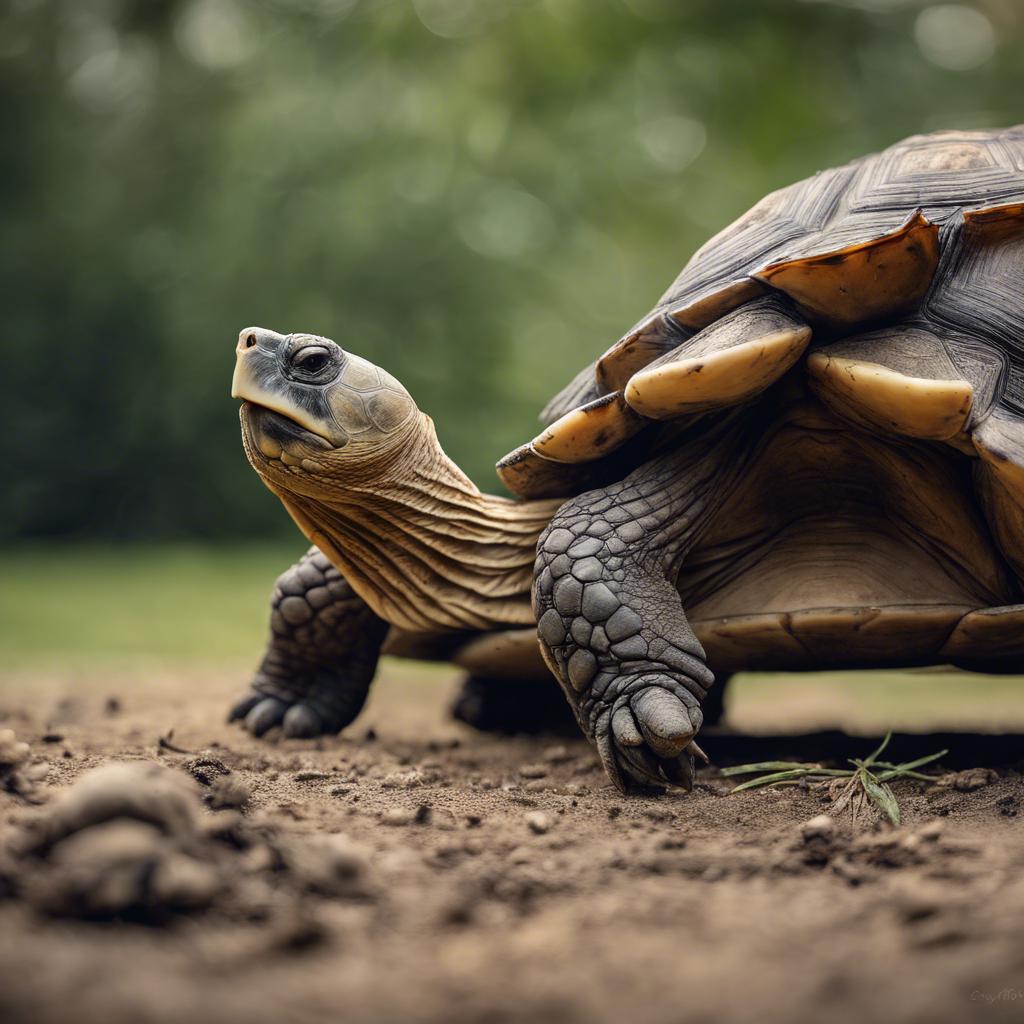Tortoise growth refers to the physical development and increase in size of tortoises over time. Understanding tortoise growth is important for several reasons. Firstly, it allows us to monitor the health and well-being of these animals. By tracking their growth, we can identify any potential issues or abnormalities that may require medical attention. Additionally, understanding tortoise growth helps us provide appropriate care and management for these creatures, ensuring they have the right diet, environment, and conditions to thrive.
Key Takeaways
- Tortoise growth is a complex process influenced by various factors.
- Factors affecting tortoise growth include genetics, diet, temperature, and environment.
- At birth, tortoises are small and vulnerable, with an average size of 1-2 inches.
- Tortoises reach maturity at different ages depending on the species, with some taking up to 20 years.
- Diet and temperature play a crucial role in the growth rate of tortoises, and owners should ensure a balanced diet and appropriate temperature for their pets.
Factors that affect tortoise growth
Several factors can impact the growth of tortoises. Genetics play a significant role in determining the size and growth rate of these animals. Different species of tortoises have different genetic predispositions for growth, which can result in variations in size and development.
Diet is another crucial factor that affects tortoise growth. A balanced and nutritious diet is essential for healthy growth. Tortoises are herbivores and require a diet rich in fiber, vitamins, and minerals. Feeding them a variety of leafy greens, vegetables, fruits, and occasional protein sources like insects or worms can promote optimal growth.
The environment also plays a role in tortoise growth. Temperature, humidity, and lighting conditions can impact their metabolism and overall health. Tortoises require specific temperature ranges to maintain their metabolic processes and promote healthy growth. Providing them with a suitable habitat that mimics their natural environment is crucial for their well-being.
The average size of a tortoise at birth
Tortoises are relatively small when they are born compared to their adult size. The average size of a tortoise at birth varies depending on the species. For example, a baby Russian tortoise may measure around 2-3 inches in length and weigh approximately 20-30 grams. On the other hand, a baby Sulcata tortoise can be larger, measuring around 4-6 inches in length and weighing 50-100 grams.
It is important to note that the size of a tortoise at birth does not necessarily indicate its potential adult size. Tortoises grow slowly over time, and their growth rate can vary depending on various factors such as genetics, diet, and environment.
How long does it take a tortoise to reach maturity?
Tortoises are known for their slow growth rate, and it can take several years for them to reach maturity. The time it takes for a tortoise to reach maturity varies depending on the species. Smaller species of tortoises, such as the Russian tortoise, may reach maturity in 5-7 years. Larger species, like the Sulcata tortoise, can take anywhere from 15-20 years to reach maturity.
Reaching maturity means that the tortoise has reached its full size and is capable of reproducing. However, it is important to note that even after reaching maturity, tortoises continue to grow slowly throughout their lives.
The growth rate of different tortoise species
Different species of tortoises have varying growth rates. Some species grow faster than others, while some have a slower growth rate. For example, the Russian tortoise is known for its relatively fast growth rate compared to other species. It can reach its adult size within 5-7 years.
On the other hand, larger species like the Sulcata tortoise have a slower growth rate. It can take up to 15-20 years for them to reach their full size. Factors such as genetics, diet, and environment can contribute to these variations in growth rates among different species.
The impact of diet on tortoise growth

Diet plays a crucial role in promoting healthy growth in tortoises. A well-balanced and nutritious diet is essential for providing the necessary nutrients for growth and development. Tortoises are herbivores and require a diet that consists mainly of leafy greens, vegetables, and fruits.
Leafy greens such as dandelion greens, collard greens, and kale are excellent sources of fiber and essential vitamins for tortoises. Vegetables like carrots, squash, and bell peppers provide additional nutrients. Fruits should be given in moderation due to their high sugar content.
It is important to provide a varied diet to ensure that tortoises receive all the necessary nutrients for healthy growth. Additionally, providing calcium supplements and occasional protein sources like insects or worms can contribute to their overall growth and well-being.
The role of temperature and environment in tortoise growth
Temperature and environmental conditions play a significant role in tortoise growth. Tortoises are ectothermic animals, meaning they rely on external heat sources to regulate their body temperature. Maintaining the appropriate temperature range is crucial for their metabolic processes and overall health.
Tortoises require a basking area with a temperature range of 90-95 degrees Fahrenheit (32-35 degrees Celsius) to aid digestion and promote healthy growth. The ambient temperature in their enclosure should be around 75-85 degrees Fahrenheit (24-29 degrees Celsius). Providing a temperature gradient allows tortoises to regulate their body temperature by moving between warmer and cooler areas.
Humidity levels should also be considered, as tortoises require a certain level of humidity for proper hydration and shell health. Providing a shallow water dish or misting the enclosure can help maintain adequate humidity levels.
How to ensure healthy growth for pet tortoises
To promote healthy growth in pet tortoises, several factors need to be considered. Firstly, providing a suitable habitat that mimics their natural environment is crucial. This includes providing the right temperature gradient, humidity levels, and lighting conditions.
A well-balanced diet is essential for healthy growth. Feeding a variety of leafy greens, vegetables, and occasional fruits, along with calcium supplements and protein sources, can ensure that tortoises receive all the necessary nutrients for growth and development.
Regular veterinary check-ups are also important to monitor the health and growth of pet tortoises. A veterinarian specializing in reptiles can provide guidance on proper care and identify any potential health issues that may affect growth.
The lifespan of a tortoise and its growth over time
Tortoises have long lifespans, with some species living for several decades or even over a century. As they age, tortoises continue to grow, although at a slower rate compared to their younger years. Their growth becomes more gradual, and they may experience changes in their shell shape and size.
It is important to provide appropriate care and management throughout their lives to ensure their continued growth and well-being. Regular monitoring of their diet, environment, and overall health is crucial to promote healthy growth and prevent any potential issues.
Understanding tortoise growth for better care and management
Understanding tortoise growth is essential for providing optimal care and management for these fascinating creatures. Factors such as genetics, diet, environment, and temperature play significant roles in their growth and development. By monitoring their growth, providing a balanced diet, maintaining suitable environmental conditions, and seeking regular veterinary care, we can ensure that tortoises grow healthily throughout their lives. This knowledge allows us to promote their overall health and well-being, ensuring they live long and happy lives.
If you're interested in learning about the growth rate of tortoises, you might also find this article on reptilewizard.com fascinating. It explores the topic of how long it takes a tortoise to grow and provides valuable insights into their development. To further expand your knowledge on reptile care, you can also check out these related articles: Are Pothos Safe for Bearded Dragons? and Can Bearded Dragons Eat Black Beans? These resources will help you become a well-informed reptile enthusiast.
FAQs
What is the average lifespan of a tortoise?
The average lifespan of a tortoise is around 80-150 years, depending on the species.
How long does it take for a tortoise to reach maturity?
The time it takes for a tortoise to reach maturity varies depending on the species, but it can take anywhere from 3 to 20 years.
How fast do tortoises grow?
Tortoises grow very slowly, and their growth rate depends on the species, diet, and environmental conditions. On average, a tortoise can grow up to 1-2 inches per year.
What factors affect the growth rate of a tortoise?
The growth rate of a tortoise can be affected by various factors such as diet, temperature, humidity, and genetics.
How big can a tortoise get?
The size of a tortoise depends on the species, but some species can grow up to 4 feet in length and weigh up to 500 pounds.
What is the smallest species of tortoise?
The smallest species of tortoise is the speckled padloper tortoise, which only grows up to 3-4 inches in length.
What is the largest species of tortoise?
The largest species of tortoise is the Galapagos tortoise, which can grow up to 4 feet in length and weigh up to 500 pounds.

